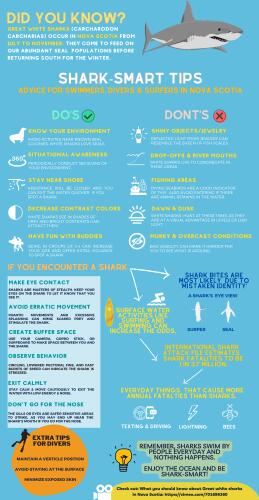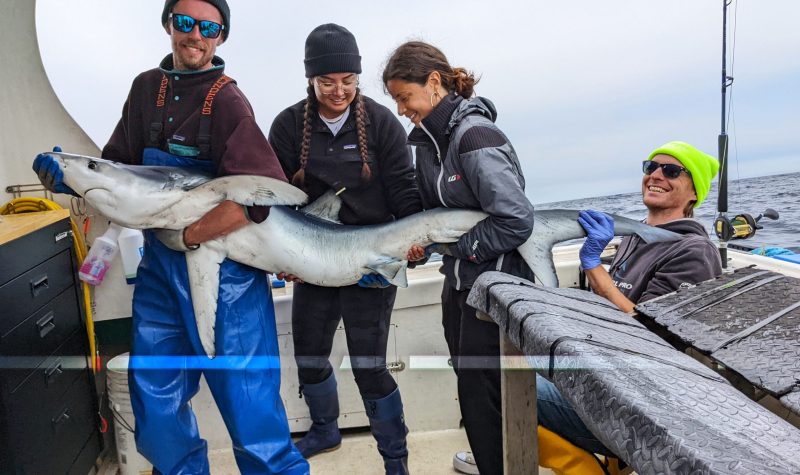Vanessa Schiliro is a Dalhousie University student who is in the process of completing honours in marine biology. Schiliro developed a video and infographic that provided advice for swimmers, divers and surfers in Nova Scotia to help them avoid shark encounters and, ultimately, help them stay safe.
"The idea was inspired by a lot of the media headlines; I was reading and talking about the fact that we were tagging big sharks here. And also about the unconfirmed shark attack that happened last summer, and I realized that could have given rise to some concerns. So I wanted to create something that could hopefully alleviate some of that fear just by developed developing some basic educational materials," said Schiliro.

Vanessa Schiliro created an infographic of preventive measures, advice, tips, and what to do in the face of shark encounters. Photo contributed.
Tagging sharks helps scientists know where they are located and understand if they have preferences for certain habitats.
"It also helps us establish things like site fidelity-sharks coming back to a specific area at a specific time every year, if so, it might be an important area to protect. Keeping track of this just gives us great data to inform conservation measures, and just bring that into policy consideration so that we're effective in protecting sharks."
Nova Scotia has a lot of different shark species that live here. Year-round, greenland sharks, porbeagle sharks, and black dogfish can be found in Atlantic waters.
Seasonally, when the water gets warmer, great white sharks make an appearance, as well as basking sharks, mako sharks, blue sharks, and spiny dogfish, who return to warmer areas during the winter. From July to November, white sharks return to Nova Scotia before heading south for winter to feed on seals.

Schiliro told CKDU that although sharks are not a threat to Nova Scotia, to be safe, Schiliro recommends avoiding activities near known seal colonies and areas with active fishing, as they can be potential shark attractants. Photo by Nathan Wisnicki.
Although sharks predate the dinosaur era, Schiliro says some shark species are at risk of extinction.
"I think the reality today is that a lot of shark species are endangered. There was a study in 2021 that actually claimed that 1/3 of sharks and ray species are facing extinction. Often, we're scared of sharks, but the biggest threat to sharks is actually us," said Schiliro.
Schiliro explained the reason behind the rising number is due to overfishing, as some sharks are fished for their fins and meat. Another reason that some shark species are endangered is due to accidental fishing; when sharks get caught in the net with other fish in high seas.
Sharks are not a threat to Nova Scotia, as the last recorded shark attack was in 1981. However, to be safe, Schiliro recommends avoiding activities near know seal colonies and areas with active fishing, as they can be potential shark attractants.

Schiliro released a five-minute educational video that answers questions about sharks in Nova Scotia. Photo contributed.
During our interview, CKDU found some questions and widely shared shark statements online, which Schiliro answered as fact or false.
1. Are sharks blind?
"No, some of them have acute eyesight. When the eye is rolling back, what you're seeing is the eye protecting itself from potential damage when it's going in to attack prey, some sharks will have a nictitating membrane."
2. Do sharks predate dinosaurs?
"Yes. We can find fossils on the fossil record that date back to 400 million years ago, which is 200 million years before dinosaurs."
3. Do sharks have a set of 300 teeth?
"Let's just pick that statement apart. Sharks have rows of teeth that act as conveyor belts. So every time throughout their lifetime, they lose their teeth. If they lose a tooth from these rows, these teeth come forward, and this is what happens with age or if teeth are damaged. So, at one moment in time, a shark will not have 300 active teeth. The rows of teeth can range from five to 15."
4. If a shark comes near you, is punching it on the nose a good way to steer it's direction?
"No, the nose is a sensitive area, but so are the eyes and the gills. A shark might come near you, but it doesn't mean that it's going to attack you and if you start striking at it, that might actually be bad for you. Ideally, you'll just want to avoid frantic movements and observe how the shark is behaving before you start to splash excessively or yell."
5. What do sharks like to eat them if not people?
"Their diet is varied. Some sharks like to just eat mackerel and tuna. Tiger sharks eat sea turtles; white sharks like marine mammals like seals, sea lions, and it's been known that larger sharks could prey on more juvenile smaller sharks as well."
6. Is it [unhealthy] for people to eat sharks?
"It's kind of a controversial topic right now. Typically speaking, sharks clean the oceans: they consume weaker species so they keep systems healthy by doing that. Also, because of their tissues, they tend to absorb and store a lot of toxins like mercury. So, consuming certain species could elevate your risk of consuming things like mercury. But the reality is that in a lot of parts of the world, shark meat is a reliable source of protein."
7. Now that the megalodon is extinct, what is the largest species of shark?
"The largest shark would be the whale shark, which could be up to 40 feet in size. And then right after that is the basking shark, which is 30 could reach 30 feet in size. What's funny about that, actually, since we just talked about what they eat, so these big sharks are actually filter feeders that eat zooplankton."
8. Do sharks have a sixth sense?
"Sharks have two additional things that are quite impressive. One would be what we call the lateral line, which is equivalent maybe to our touch. So it's these tiny pores that go from the snout to the tail, that essentially send tiny vibrations and changes in pressure in the water. So that's one cool sensory part of their sensory system. The second is electroreception: these tiny pores on their snout, which are called ampullae lorenzini. These can detect the electrical field of species or prey that are around them. So that makes them really calculated predators out in the ocean finding their favorite food."
9. Can sharks smell blood from a mile away?
"I read this funny statement saying that they can smell one drop of blood from a mile away, and I think the reality is that they do have these highly developed sensory systems. It's much more developed than us humans, but the way water molecules will dissipate in the ocean and travel because of ocean currents makes that statement very overblown."
10. What are some ways people can protect sharks?
"I think one of the simplest things we can do that requires little to no effort is to just continue learning about them and sharing what we learn with those around us. In the more recent years, there's been a really positive shift in terms of how we're thinking about sharks; I think people are more curious about them. So social media is a great tool for that. If you're a student, get involved in local campaigns or start a club at your school."
Listen to the full interview below:


